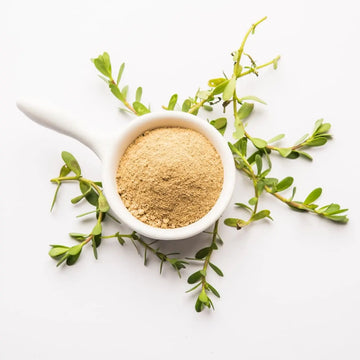Ayurvedic Herbs Worth Knowing
Ayurvedic medicine is an ancient form of traditional medicine originating in India that has been practiced for thousands of years. It is a holistic approach to health and well-being, focusing on harmonizing the body and mind to prevent and treat disease. It is now gaining popularity and is practiced in many places around the world. Ayurveda uses various methods, including herbs, to promote overall well-being and health.
In this article, we will briefly present the most important Ayurvedic herbs worth knowing. In Ayurveda, herbs are classified as either "Rasayana" (rejuvenating) or "Vajikarana" (aphrodisiac).
1. Ashwagandha: Ashwagandha is also known as Indian ginseng and has been used in Ayurvedic medicine for centuries to reduce stress and anxiety, boost immunity and promote healthy, restorative sleep. It is rich in antioxidants, iron and amino acids, making it a powerful adaptogen.
2. Turmeric:
Turmeric is a bright yellow spice that is commonly used in Indian cuisine. Ayurveda has valued its anti-inflammatory and antioxidant properties. Turmeric is used to prevent digestive problems, has a beneficial effect on the skin, and also relieves cold symptoms. You can add turmeric to most dishes or take it separately from meals in combination with a small amount of honey. We recommend the latter as a natural method of relieving cold symptoms.
3. Tulsi - Holy Basil:
Holy Basil, also known as Tulsi, is a sacred herb in Ayurveda. It is known for its healing properties and is used to support the respiratory system, promote skin health and the digestive system. Holy Basil also has anti-inflammatory and antioxidant properties. It has a calming effect on the mind.
4. Brahmi:
Brahmi, also known as Bacopa, is an herb commonly used to support cognitive function, memory, and learning. It is also used during times of tension and stress.
5. Amla:
Amla, also known as Indian gooseberry, is a rich source of vitamin C and antioxidants. It is used in Ayurveda to improve digestion, boost immunity, and promote healthy skin and hair.
6. Neem, or Indian lilac
Neem is a tree native to India that has been used for thousands of years in Ayurvedic medicine. It is known for its antibacterial, antifungal, and antiviral properties. Neem has a beneficial effect on the skin and hair, relieves acne symptoms, and scalp problems.
7. Triphala:
Triphala is a combination of three Ayurvedic herbs, including Amla, Haritaki, and Bibhitaki. It is used to detoxify the body, aid digestion, and strengthen immunity. Triphala effectively supports seasonal cleansing, facilitating the elimination of toxins that accumulate in the tissues and has a mild laxative effect.
8. Guduchi (Giloy):
Guduchi, also known as Tinospora cordifolia, is an herb that has been used in Ayurvedic medicine for centuries. It is believed to have anti-inflammatory, antiviral, and immune-boosting properties. It can also help alleviate allergy symptoms.

It is important to remember that Ayurveda approaches people individually - each individual should practice their own daily routines, and may also be recommended appropriate herbal supplements depending on their needs. Before using herbs, especially if you are ill and taking medication, or are pregnant or breastfeeding - always consult your doctor and do not use herbs on your own.



